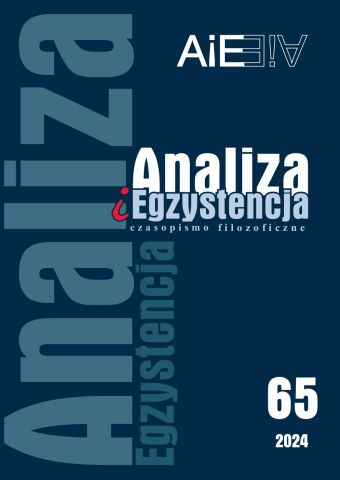
ISSN: 1734-9923
eISSN: 2300-7621
OAI
DOI: 10.18276/aie.2024.65-01





Liste der Ausgaben /
65 (2024)
How Broad Modal Fictionalism Can Survive Rosen’s Challenge
| Autoren: |
Tomasz
Puczyłowski

Uniwersytet Warszawski |
| Schlüsselbegriffe: | fikcjonalizm fikcja modalny realizm światy możliwe |
| Data publikacji całości: | 2024 |
| Seitenanzahl: | 15 (5-19) |
Abstract
Gideon Rosen described the difficulties faced by those who claim that statements about possible worlds cannot be literally true. According to his argument, if the truth of modal sentences could be explained by referring to the hypothesis of the plurality of possible worlds, which is a sort of fiction for modal irrealists, the position would have antinomic consequence. I argue that the advocate of broad modal fictionalism can avoid such a devastating conclusion. To that end, her position should be given in meta-language describing the necessary and sufficient conditions of accepting modal sentences as true in terms of fiction of possible worlds. I show that there is a coherent way of reading ‘it is accepted as true’ that allows one to maintain that the disjunction of two mutually contradictory propositions can be accepted without accepting either of them.
herunterladen
Artikeldatei
Bibliographie
| 1. | Adams, F., & Dietrich, L. (2004). What’s in a(n empty) name?. Pacific Philosophical Quarterly 85,125–148. https://doi.org/10.1111/j.0279-0750.2004.00191.x |
| 2. | Adams, F, & Fuller, G. (2007). Empty names and pragmatic implicatures. Canadian Journal of Philosophy 37, 449–462. https://doi.org/10.1353/cjp.2007.0024 |
| 3. | Currie, G. (1990). Nature of Fiction. Cambridge University Press, Cambridge. |
| 4. | Føllesdal, D. (1968). Quine on modality. Synthese 19, 147–157. https://doi.org/10.1007/bf00568055 |
| 5. | Marciszewski, W. (1972). Podstawy logicznej teorii przekonań. PWN, Warszawa. |
| 6. | Marciszewski, W. (1973). The problem of existence of intentional objects. Studia Semiotyczne – English Supplement 4, 141–160. |
| 7. | Nolan, D. (1997). Three problems for ‘strong’ modal fictionalism. Philosophical Studies 87(3), 259–275 https://doi.org/10.1023/a:1004218817629 |
| 8. | Nolan, D. (2020). Modal fictionalism. In: Zalta E N (ed) The Stanford Encyclopedia of Philosophy, https://plato.stanford.edu/archives/spr2020/entries/fictionalism-modal/ Cited 1 Oct 2022 |
| 9. | Puczyłowski, T. (2021). Fictional names, their use and pragmatic interpretations. Semiotica 240, 165–185 https://doi.org/10.1515/sem-2020-0005 |
| 10. | Quine, W. V. (1947) The problem of interpreting modal logic. Journal of Symbolic Logic 12(2), 43–48. https://doi.org/10.2307/2267247 |
| 11. | Rosen, G. (1990). Modal fictionalism. Mind 99(395), 327–354. https://doi.org/10.1093/mind/xcix.395.327 |